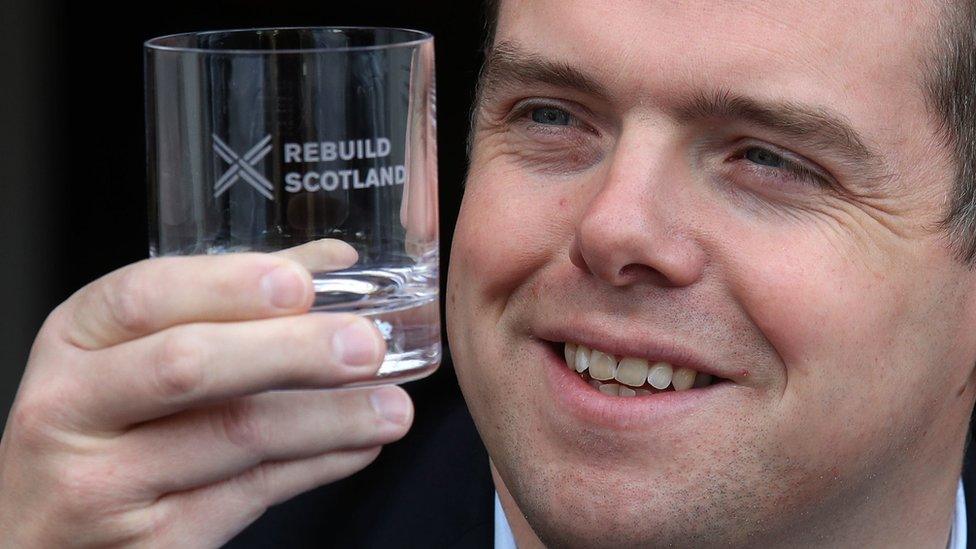Scottish election 2021: Ross says independence case 'weaker than ever'
- Published

Douglas Ross criticised the case for independence as he highlighted his party's plans for economic recovery
The Scottish Conservatives have said the case for independence is "weaker than ever" while on the campaign trail.
It comes after a report from the Institute for Government (IfG), external said an independent Scotland would face "difficult fiscal adjustments".
The think tank also said it was not clear what the country's fiscal position would be in that scenario.
The SNP's Kate Forbes, the finance secretary, said independence would give Scotland more control over its economy.
According to the IfG report, the budget deficit of an independent Scotland would probably be larger than the 7.7% of GDP figure reported in 2018-19 due to the Covid pandemic.
It said Scotland's fiscal position would be dependent on negotiations with the UK government on issues like how much debt should the country be left with.
Gemma Tetlow, the author of the report and chief economist at the IfG, said: "Any advocates for breaking away from the UK must address the reality of the nations' current fiscal imbalances and the difficult policy choices these would necessitate after secession."

SIGN UP FOR SCOTLAND ALERTS: Get extra updates on BBC election coverage

While visiting a glass engraving business in East Kilbride, Mr Ross said it was the "strength of the United Kingdom" that would assist recovery through the furlough scheme and vaccination roll-out.
He said: "The nationalists would have us break away from that stability, just when we need to stick together the most.
"The SNP's plans for another referendum would smash Scotland's fragile economic recovery into pieces. Our efforts to protect jobs would be shattered and Scotland's economy would descend into chaos."
Speaking about the IfG report, Finance Secretary Kate Forbes said: "Government Expenditure and Revenue Scotland represents Scotland's situation as part of the union - not the finances of an independent country, when different choices can and will be made.
"When it comes to the finances of independence, as the Institute for Fiscal Studies has said, Scotland is a rich country - however, we don't yet have full control over those many resources."
Meanwhile SNP leader Nicola Sturgeon highlighted the Scottish government's 4% pay rise offer for NHS staff during a campaign event on Wednesday.
Allow X content?
This article contains content provided by X. We ask for your permission before anything is loaded, as they may be using cookies and other technologies. You may want to read X’s cookie policy, external and privacy policy, external before accepting. To view this content choose ‘accept and continue’.
'Injection of honesty'
On Wednesday the Electoral Commission launched a formal investigation into the funding of Boris Johnson's Downing Street flat after the PM came under pressure to declare how refurbishments were paid for.
Scottish Labour's Ian Murray hit out at Mr Ross' party, saying they were "not up to the job" due to the allegations of "sleaze" aimed at the Westminster government and that questions over Mr Johnson's conduct "weakens the union".
He said: "We need an injection of honesty about the cost of separation into Scotland's political debate.
"Today's announcement of the Electoral Commission investigation drives home that if the incompetent and scandal-hit Tories remain the main opposition at Holyrood, the SNP will be able to hide its own failings behind Tory failure."
Mr Murray made the comments as the party's leader Anas Sarwar campaigned for the protection of public services as he highlighted closures of libraries, sports facilities and public halls in Glasgow.
Elsewhere on the campaign trail, Lib Dem leader Willie Rennie set out a proposal to create a new minister for recovery post, which would replace the deputy first minister role.
Mr Rennie said the person appointed would have responsibility for cross-government work on pandemic recovery.
He said: "We know that top civil servants will be used to draw up the plan for independence. They will be skilled negotiators who will have to sort out the arguments between the different factions of the nationalists about the currency, central bank and whether to re-join the EU.
"This talent should be used instead to plan a recovery that balances the needs of the health service, education and business."

SCOTLAND'S ELECTION: THE BASICS
What's happening? On 6 May, people across Scotland will vote to elect 129 Members of the Scottish Parliament (MSPs). The party that wins the most seats will form the government. Find out more here.
What powers do they have? MSPs pass laws on aspects of life in Scotland such as health, education and transport - and have some powers over tax and welfare benefits.

The Scottish Greens visited the Maryhill Integration Network in Glasgow as they raised concerns about the treatment of refugees and asylum seekers in the city.
Co-leader Patrick Harvie said it was "utterly inexcusable" for the Home Office to place people in detention facilities during a pandemic.
He said: "Scottish Greens won voting rights for refugees and we will do the same for asylum seekers. We are clear that instead of locking people that flee to this country up, we should be allowing them to contribute to our future."

POLICIES: Who should I vote for?
CANDIDATES: Who can I vote for in my area?
PODLITICAL: Updates from the campaign
